2023 AADOCR Distinguished Lecture Speakers
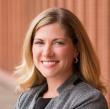
Dr. Julie R. Posselt
Associate Dean, Graduate School
Associate Professor of Education
University of Southern California
Equity in Science: Representation, Culture, and the Dynamics of Change
Sponsored by:

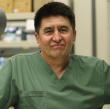
Dr. Shoukhrat Mitalipov
Professor and Director,
Center for Embryonic Cell and Gene Therapy,
Oregon Health & Science University
Gene and Cell Therapy in Reproductive Medicine
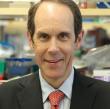
Dr. Brian J. Druker
Director, OHSU Knight Cancer Institute
Imatinib as a Paradigm of Targeted Cancer Therapies
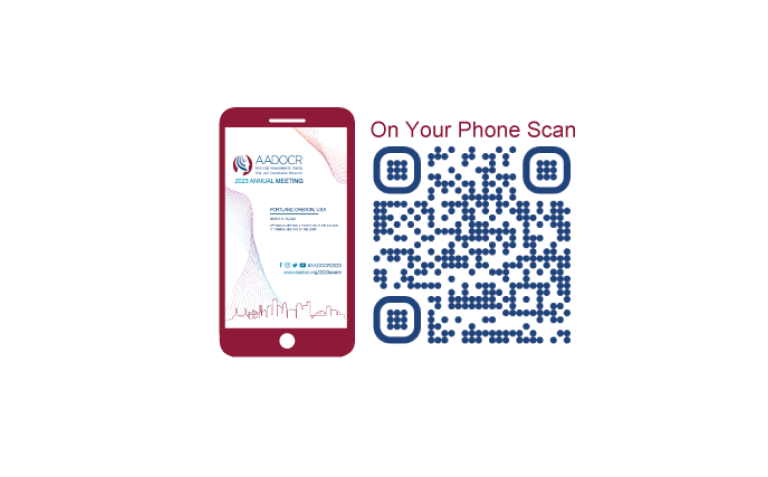
Plan your Annual Meeting experience.
Download the IADR App-
Supported by 
As part of the AADOCR science-first initiative to bring new opportunities for membership, professional development, and program growth, AADOCR presents the second Meeting within a Meeting (MwM) featuring cutting-edge presentations on broader themes in dental, oral, and craniofacial science. The first MwM in 2022 was on Contemporary Artificial Intelligence Applications in Dental Research.
These presentations are open to all 2023 AADOCR/CADR Annual Meeting & Exhibition attendees, no additional registration is required.
Overall goal: Geroscience is a trans-NIH research initiative. It is increasingly important as we have increases in both lifespan and chronic diseases. This three-part educational symposium will address the biology and social aspects of aging, and how aging affects health and disease.
Day 1: Setting the Geroscience Scene: Biologic Mechanisms of Aging and Oral Health Significance
The goal of this first session is to give AADOCR delegates a broad overview of current geroscience research about the biologic mechanisms of aging and how they impact oral diseases.
Wednesday, March 15, 2023
8 a.m.-9:30 a.m. PTChairs: Jane Weintraub, AADOCR President and R. Gary Rozier and Chester W. Douglass Distinguished Professor, University of North Carolina at Chapel Hill Adams School of Dentistry and Yvonne Hernandez-Kapila, University of California-Los Angeles.
Keynote Speaker
Biologic Mechanisms of Aging
Matt Kaeberlein, University of Washington, SeattleSpeakers
Oral Cancer and Aging
Keith Kirkwood, University at Buffalo, New YorkAlzheimer’s and Periodontal Disease
Mark Ryder, University of California, San Francisco
Day 2: Behavioral and Social Aspects of Aging and Oral Health Significance
The goal of the second session is to provide a holistic overview of the social and behavioral aspects of aging, including nutrition and cognitive decline, and the relationships with oral disease.
Thursday, March 16, 2023
8 a.m.-9:30 a.m. PTChair(s): Jane Weintraub, AADOCR President and R. Gary Rozier and Chester W. Douglass Distinguished Professor, University of North Carolina at Chapel Hill Adams School of Dentistry and Kathryn Atchison, University of California-Los Angeles.
Keynote Speaker
Addressing Loneliness and Isolation in Older Adults: A Medical and Public Health Perspective
Carla Perissinotto, University of California, San FranciscoSpeakers
Tooth Loss and Cognitive Decline
Bei Wu, New York University, New YorkOral Health and Nutrition in Aging
Riva Touger-Decker, Rutgers University, Newark, New Jersey
Day 3: Research & Training Needed to Improve Delivery of Care for Older Adults
The third session will focus on research and training needed to improve the delivery of oral health care for aging populations.
Friday, March 17, 2023
8 a.m.-9:30 a.m. PTChair(s): Jocelyne Feine, McGill University, Montreal, Quebec, Canada and Xi Chen, University of Iowa, Iowa City
Speakers
Delivery of Care in Institutional and Home-based Settings: Research Needed
Elisa Ghezzi, University of Michigan, Ann Arbor.An Approach from a Dental Provider Network: Research Needed
Lyubov Slashcheva, Appletree Dental, Rochester, MinnesotaEvidence for Coverage of Oral Health Services in Aging Populations & Research Needed
Natalia Chalmers, Centers for Medicare and Medicaid Services, HHS, Washington, DC (invited)Future Directions for Oral Health Research and Aging
Rena D’Souza, NIDCR, Rockville, Maryland -
Cost per session: $25
Thursday, March 16, 12:45 p.m. – 1:45 p.m.
FLS #1: Discussing Animal Models of Bone/Dentin Regeneration with Students and Scholars
Speaker: Patricia Miguez (University of North Carolina, Chapel Hill)
Sponsoring Group/Network(s): Dental Materials, Women in Science Network, Periodontal Research, Mineralized Tissue
Track Selection: C, E
Description: Hard tissue reconstruction in the maxillofacial area, although highly researched, remains unpredictable due to the complexity of the tissues including cell-microenvironment interfaces in bone and dentin. Despite significant advances in cell-based and cell-free grafts, biomaterial technology and variety of biologics, a set of individuals still present with bone grafting failures albeit the use of the best available therapies in the market. The appropriate design of pre-clinical studies to investigate regenerative therapies is crucial in ensuring clinical success. However, many animal models of mineralized tissue regeneration and maintenance exist and have different attributes, caveats and indications which must be understood for the proper interpretation of results and future application towards human conditions. This focused learning session aims to discuss various animal models of bone and dentin regeneration with students and scholars with the intent to critically review the advantages and disadvantages of different models and provide guidelines to students when designing their own studies. The Miguez lab has used multiple hard tissue models of regeneration and bone loss and the speaker will share her experience and a thorough literature review on the topic.
FLS #2: Will Self-adhesive Composites Have a Future in Restorative Dentistry?
Speaker: Antonio HS Delgado (Centro de Investigação Interdisciplinar Egas Moniz (CiiEM), Almada, Portugal)
Sponsoring Group/Network(s): Dental Materials
Track Selection: E, C
Description: The search for simplicity has always accompanied the history and evolution of modern adhesive dentistry. This led to the creation of simpler, user-friendly systems over the years, that make the procedures easier for the clinician to undertake and the patient to endure. Self-adhesive composites (SACs) were developed and introduced in restorative dentistry to surpass current multi-step adhesive systems, which are not ideal in terms of technique sensitivity, chair time required and expenditure. The self-adhesiveness of SACs is due to functional acidic monomers in their chemical composition. However, this simple alteration in the chemical composition of composites may not be enough to secure clinical success. Thus, it is important to review the properties and flaws of current commercial SACs and understand where they stand in relation to other current restorative materials, so as to plan the future prospects of this class of materials.
FLS #3: Utilization & Predictability of Implant Retained cantilever Prostheses
Speaker: Kenneth Kurtz (Montefiore Medical Center, Bronx, NY)
Sponsoring Group/Network(s): Prosthodontics
Track Selection: E, C
Description: Cantilever designs have existed for decades in restorative dentistry. For many reasons, cantilevers become necessary in implant dentistry. Their use can be used by anatomic limitations, esthetic concerns, or failure of implant integration. Properly prescribing pontic and retainer design for screw or cement retained cantilever prostheses can be confounding. Clinical treatment illustrating one abutment, one pontic and multiple abutments, one pontic designs will be detailed and accompanied by supporting scientific literature. Success can be ably predicted via “trial by provisional.”
View list of Focused Learning Session.
-
View the list of Hands-on Workshops.
TUESDAY, MARCH 14, 2023
8 a.m. – 3 p.m.HOW #1: AADOCR Faculty Development Workshop
Organizer(s): Effie Ioannidou (University of Connecticut, Mansfield); David Drake (University of Iowa, Iowa City)
Sponsoring Group/Network(s): Women in Science Network
Description: This workshop is part of the NIDCR funded AADOCR Mentoring an Inclusive Network for a Diverse Workforce of the Future (AADOCR MIND the Future). Current evidence has supported the significance of faculty development as a tool for academic retention and advancement. In this process, mentoring holds tremendous significance as it guides post-graduate students towards their career goal and supports junior faculty in their academic growth. A key component of this is learning how to write competitive research grants. In today’s highly competitive environment at NIH and other funding agencies, these skills have become of even more paramount importance for young scientists to establish themselves as independent investigators.This workshop is designed to support the processes of mentoring and career development in a bidirectional way. First, it focuses on junior faculty and post-graduate students with the goal to enhance their grant-writing skills as part of an overall emphasis on research portfolio and scholarly productivity. Coinciding with this is the importance of building a close look at work/life balance expectations. In a parallel session, the workshop focuses on mentoring the mentors with a goal to promote effective communication skills, to address diversity and unconscious bias, to closely mentor mentees in all aspects of their academic growth and to present techniques to synchronize mentor and mentee expectations. Two parallel sessions will take place in the morning.
Attendance Limit: 40
Cost: $130WEDNESDAY, MARCH 15, 2023
12 p.m. – 1:15 p.m.HOW #2: AADOCR/CADR/NICR Mentoring and Networking Lunch
Organizer(s): Anissa Brown (National Institute of Health, Bethesda, MD); Shoba Thirumangalathu (National Institute of Health, Bethesda, MD); Lynn King (National Institute of Dental and Craniofacial Research, Bethesda, MD
Sponsoring Group/Network(s): American Association for Dental, Oral, and Craniofacial Research (AADOCR), Canadian Association for Dental Research (CADR)
Description: The AADOCR/CADR and NIDCR are offering a mentoring and networking lunch aimed at facilitating interactions among predoctoral students, postdoctoral scientists and dental, oral and craniofacial research investigators. This event, planned for Wednesday March 15 from 12 p.m. to 1:15 p.m., is designed to provide an informal venue for early career scientists to obtain guidance on their research and research career trajectories, and to expand their network of mentors and peers to support and facilitate their research career success. Mentors will be encouraged to lead informal, motivational and realistic discussions about developing a successful research career. Lunch tables will be organized by research topic or career pathway, and one to two mentors will be available at each table. When registering, participants do not need to select a specific table or mentor and will be encouraged to move among tables and meet a number of mentors during the session. AADOCR/CADR Annual Meeting attendees who register as students (e.g., graduate students, dental students and postdoctoral researchers) will be able to sign up for the Mentoring and Networking Lunch for an additional fee through the AADOCR/CADR meeting registration site.
Attendance Limit: 80
Cost: $25WEDNESDAY, MARCH 15, 2023
9:45 a.m. – 11:15 a.m.HOW #3: Retaining DSTP and NIDCR trainees in Dental, Oral and Craniofacial Research
Organizer(s): Tanner Godfrey (University of Alabama at Birmingham)
Sponsoring Group/Network(s): Student Training and Research (STAR) Network, National Student Research GroupDescription: This session will focus on how institutions can support DSTP (Dental Scientist Training Program) students and training grant students in order to encourage their retention in research and academia. An expert panel will discuss the historic challenges and successes of DSTP and training grant programs followed by a discussion covering current trajectories and strategies to support trainees. Finally, a Q&A session with the expert panel and the session target audience (program directors, mentors and current trainees) will be held.
The expert panel will consist of representation from NIDCR as well as successful current and past program directors from variously structured training programs.WEDNESDAY, MARCH 15, 2023
1:30 p.m. – 3 p.m.HOW #4: Walking the Tightrope – Staying Balanced while in School
Organizer(s): Kazune Pax (Ohio State University, Columbus); Shawn Hallett (University of Michigan, Ann Arbor); Seung Jin Jang (University of Florida, Gainesville)
Sponsoring Group/Network(s): Behavioral, Epidemiologic, and Health Services Research, Student Training and Research (STAR) Network
Description: Graduate and professional students face a broad and unique set of challenges during their training. Trainees are often pulled in multiple directions by competing obligations and require a substantial commitment in time, effort, and mental resilience. As a result, trainees commonly report difficulty finding balance in life, which leads to heightened levels of stress having a negative impact on their academic performance, physical health, and mental stability. Because of this, hobbies tend to become forgotten or are ignored. Time spent with significant others and friends, sleep, and exercise often get pushed to the back burner in an attempt to finish the unstoppable rigor of training. Intended for trainees of all types (e.g., dental and dental hygiene students, graduate students, dual-degree students, post-docs), this Hands-on Workshop will focus on the unique challenges experienced by trainees and will offer participants tips and skills for maintaining balance during their training and beyond. The panelists will include grant funded researchers, academic leaders, and current students who have maintained their hobbies and vibrant lives that extend beyond their professional responsibilities. The panelists will discuss workshop topics from their unique career backgrounds, expertise, and perspectives and will offer stories of their real-life experiences, and advice based on their mentorship of trainees. The session will be structured as an open agenda panel, with a moderator to help guide discussion. There will be an opportunity for attendees to use what they learn to set goals and create action plans for adopting wellness practices and finding work-life balance throughout their training and extending beyond into their future endeavors.THURSDAY, MARCH 16, 2023
8 a.m. – 9:30 p.m.HOW #5: What We Wish We Knew When Starting in Dental Academics
Organizer(s): Hope Amm (University of Alabama at Birmingham); Modupe Coker (Rutgers University, Brunswick, NJ); Erin Bumann (University of Missouri, Kansas City)
Sponsoring Group/Network(s): Clinical and Translational Science Network, Women in Science Network, MIND the FutureDescription: Diverse and inclusive investigators help advance dental, oral, and craniofacial research and bring in new concepts for the growth of the fields in multi-dimensional ways. Establishing mentoring networks supports the junior investigator pipelines, strengthens senior investigators' mentoring competencies, and increases sensitivity to unique challenges facing investigators from diverse backgrounds. Such efforts are needed to develop a robust biomedical, behavioral, clinical, and public health research workforce. AADOCR MIND the Future is a unique model, funded by NIDCR that aims to build a vibrant and inclusive community of investigators.
The objective of this Hands-on Workshop is to engage young researchers in different elements of career development important for progress. The MIND the Future mentees will lead table discussions to share what they have learned as early-stage investigators and within the program. The attendees will select a table based on an area of career development. The table leaders will provide a short background about themselves and initiate the discussion with the attendees, which should last for 30 minutes including answering their questions related to the topic, career development, or the MIND the Future Program. Attendees will be encouraged to move to another table for a new topic or different perspective for the next 30 minutes.
Attendance Limit: 60
Cost: $10THURSDAY, MARCH 16, 2023
11 a.m. – 12:30 p.m.HOW #6: Cognitive Behavior Therapy and Digital Technology for Fearful Dental Patients
Organizer(s): Suher Baker (Momentous Technologies-WiFiesta Inc, Guilford, CT)
Sponsoring Group/Network(s): Behavioral, Epidemiologic, and Health Services Research
Description: Fear and anxiety in dental homes may be as high as 43 percent among children and 16-20 percent in adults. In fact it is the second reason after cost that prohibits patients from seeking preventive, accessible and affordable dental care. Dentistry remains the only health care service that triggers fear/anxiety/phobia. The early onset of the vicious cycle of dental fear has long-term ramifications in terms of disease experience, treatment options, and cost, making it important that we better understand the mechanisms maintaining and exacerbating dental fear. Anxiety plays a crucial role in avoidance behavior by causing a deterioration in oral health and an increase in the perceived likelihood of pain even during non-invasive preventive and restorative treatments resulting in further oral health neglect. Emergency and symptom-driven treatment form a linked chain feeding back into the fear experience. Therefore, recognizing fearful patients in the dental home requires in-depth knowledge about the etiology of dental fear and an anxiety assessment prior to dental treatment. Non-pharmacologic interventions and new innovative digital app based digital technology may be essential in desensitizing anxious dental patients and extracting them from the vicious cycle of fear in the long term. Advancements in minimally invasive dentistry (MID) may be critical to the dental treatment planning to reduce fear in the dental home and decrease the burden of dental disease and reinforce preventive dentistry.THURSDAY, MARCH 16, 2023
2 p.m. – 3:30 p.m.HOW #7: Women in Science Network: Bridging the GAP!
Organizer(s): Grace De Souza (University of Louisville, KY); Luciana Shaddox (University of Kentucky, Lexington); Patricia Miguez (University of North Carolina, Chapel Hill)
Sponsoring Group/Network(s): Craniofacial Biology Research, Periodontal Research, Women in Science Network
Description: This workshop aims to support women scientists in bridging the gap between school/early career and a successful scientific career path. WISN officers will gather women with varied and successful career paths to describe their trajectories, challenges, and what made them successful in their journeys. This workshop will be tailored to recent graduates who seek advice on getting their academic careers started, assistant professors and/or early career scientists, and mid-career professionals who may be in doubt about current and future career path choices.FRIDAY, MARCH 17, 2023
11 a.m. – 12:30 p.m.HOW #8 Part 1: Workshop on Evidence Based Behavioral, Epidemiologic & Health Services Research
Organizer(s): Nitesh Tewari (All India Institute of Medical Sciences, New Delhi, India); Sukeshana Srivastav (All India Institute of Medical Sciences, New Delhi, India)
Sponsoring Group/Network(s): Behavioral, Epidemiologic, and Health Services Research
Description: The evidence-based medicine (EBM) is the quintessential aspect of modern health sciences. It not only evaluates the quality of existing evidence but also provide recommendations for improving the future research. Though originally designed for interventional studies, especially randomized controlled trials, the systematic reviews and meta-analyses have progressively diversified into other realms as well. The oral health sciences have seen its varied applications even in the domains of epidemiology, behavioral and health sciences research. However, the understanding of contemporary researchers regarding application and interpretation of EBM has been reported as inadequate globally. Hence this workshop with a hands-on module on the critical aspects of the EBM and its applications in domains of BEHSR.
Limited seating. Registration required.FRIDAY, MARCH 17, 2023
2 p.m. – 3:30 p.m.HOW #8 Part 2: Workshop on Evidence Based Behavioral, Epidemiologic & Health Services Research
Organizer(s): Nitesh Tewari (All India Institute of Medical Sciences, New Delhi, India); Sukeshana Srivastav (All India Institute of Medical Sciences, New Delhi, India)
Sponsoring Group/Network(s): Behavioral, Epidemiologic, and Health Services Research
Description: The evidence-based medicine (EBM) is the quintessential aspect of modern health sciences. It not only evaluates the quality of existing evidence but also provide recommendations for improving the future research. Though originally designed for interventional studies, especially randomized controlled trials, the systematic reviews and meta-analyses have progressively diversified into other realms as well. The oral health sciences have seen its varied applications even in the domains of epidemiology, behavioral and health sciences research. However, the understanding of contemporary researchers regarding application and interpretation of EBM has been reported as inadequate globally. Hence this workshop with a hands-on module on the critical aspects of the EBM and its applications in domains of BEHSR.
Limited seating. Registration required.SATURDAY, MARCH 18, 2023
8 a.m. – 9:30 a.m.HOW #9: Oral Health Surveys: Methods and Tips to Advance Your Research
Organizer(s): Tamanna Tiwari (University of Colorado, Boulder); Aderonke Akinkugbe (Icahn School of Medicine at Mount Sinai, New York, NY); Benjamin Chaffee (University of California San Francisco)
Sponsoring Group/Network(s): Behavioral, Epidemiologic, and Health Services Research, Evidence-based Dentistry Network, Oral Health Research, Clinical and Translational Science Network
Description: Surveys are a critical methodologic tool in oral health research in both clinical and population settings, whether assessing demographic information, attitudes, behaviors, or health conditions. The validity of research conclusions hinges on the accuracy of those measures and the generalizability of recruited survey populations. This Hands-on Workshop provides a detailed yet pragmatic look at selected modern methods in survey research while providing the audience with techniques, best practices, and practical advice to advance their survey research. Featured topics include: 1) Survey development - Building a new questionnaire that blends existing, validated questionnaire items with novel item development requires time, testing, and teamwork to create a final product that is reliable, valid, and widely applicable. 2) Secondary data analysis - Existing survey datasets are often large, representative, and available at no cost, but challenges to navigate include complexity, survey items not tailored to your research, and funding the work. 3) Online commercial panels - Panels offer a fast and convenient option for survey recruitment, but steps must be taken to assure data quality, including assessing sample generalizability and deterring computer (“bot”) responses. 4) Sampling and recruitment - Enrolling a representative survey population is essential for drawing sound conclusions and requires considerable care and attention, especially for sensitive topics and harder-to-reach populations. With numerous examples from NIH and NIDCR-funded projects and with ample opportunities for audience participation and discussion, this workshop aims to help oral health investigators at all career stages expand their capabilities in survey research. -
View the list of Keynote Addresses.
Behavioral, Epidemiological and Health Services Research
Keynote Address: The First Wave of Covid-19 and Its Influence on Social Networks of Hispanics
Gerardo Maupome (Indiana University, Fairbanks School of Public Health)Keynote Address: Community Water Fluoridation Research in Alberta, Canada: In Defense of a Population-level Approach to Prevention
Lindsay McLaren (University of Calgary, Alberta)Cariology Research
Keynote Address: Contributions Derived From the Current Understanding of Caries
Stefania Martignon (Universidad El Bosque, Bogotá, Colombia)Dental Materials
Keynote Address: The Focus of Clinical Research with CAD/CAM Ceramics and Zirconia
Denis Fasbinder (University of Michigan, Ann Arbor)Keynote Address: Emerging Strategies and Progress on Biomaterials for Restorative Dentistry
Mary Anne Sampaio de Melo (University of Maryland, College Park)Keynote Address: Neural Networks for Designing Reduced-Diameter Implants: Advantages and Limitations
Jason Griggs (University of Mississippi Medical Center, Jackson)Keynote Address: Melt Electrowriting for Regenerative Medicine
Paul Dalton (University of Oregon, Portland)Keynote Address: Large Animal Models for TMJ Disc Translational Studies
Alejandro Almarza (University of Pittsburgh, Pennsylvania)Keynote Address: Development and Maintenance of Surface Gloss of Direct Dental Composite Restorations
Juliana da Costa (Oregon Health & Science University, Portland)Mineralized Tissue
Keynote Address: Next Generation Mineralized-Tissue Regeneration: Multi-layer Scaffolds, Small Molecules and Epigenetics
Thomas Diekwisch (University of Rochester, New York)Minimally Invasive Dentistry
Keynote Address: Contribution of Adhesive Dentistry to the Promotion of MID
Junji Tagami (Tokyo Medical and Dental University, Japan)Oral & Maxillofacial Surgery
Keynote Address: Enhancing Anti-tumor Immunity for the Treatment of Head and Neck Cancer
R. Bryan Bell (Providence Cancer Institute-Oregon, Portland)Periodontal Research
Keynote Address: Periodontal Regenerative Medicine: Leveraging Innovative Nanotechnologies to Advance Patient Care
William Giannobile (Harvard School of Dental Medicine, Boston, Massachusetts)Pharmacology/Toxicology/Therapeutics
Keynote Address: Analysis Paradigm Criteria of Clinical Protocols & Medical Devices: Pharmacology & Toxicology Checks & balances in Therapeutics
Claudia Cotca (Washington Institute for Dentistry & Laser Surgery, Chevy Chase, Maryland)Salivary Research
Keynote Address: Single-cell and Spatial Transcriptomics Identifies Altered Cellular Neighborhoods in the Salivary Glands of Sjögren’s Disease Patients
Blake Warner (National Institute of Dental and Craniofacial Research, Bethesda, Maryland) -
View the full list of symposia.
3D Microphysiological Systems for Craniofacial-Oral-Dental Precision Medicine
Organizer(s): Stella Alimperti (Georgetown University, Washington, DC); Cristiane Franca (Oregon Health & Science University, Portland)
Sponsoring Group/Network(s): Stem Cell Biology Research, Craniofacial Biology Research, Pulp Biology & Regeneration Research3D-Printing for Tissue Regeneration in Dentistry
Organizer(s): Lobat Tayebi (Marquette University School of Dentistry, Milwaukee, WI)
Sponsoring Group/Network(s): Mineralized Tissue, Dental Materials, Periodontal Research, Prosthodontics Research, Oral & Maxillofacial Surgery Research, Implantology ResearchAddressing Oral Health Inequities in Priority Populations in Canada
Organizer(s): Amrinderbir Singh (University of Saskatchewan, Saskatoon, Canada)
Sponsoring Group/Network(s): Canadian Association for Dental Research (CADR)Advancing Dental Fear Research: Conceptualizations, Assessment, & New Directions
Organizer(s): Cameron Randall (University of Washington School of Dentistry, Seattle)
Sponsoring Group/Network(s): Clinical and Translational Science Network, Behavioral, Epidemiologic, and Health Services Research, Oral Health Research, Pediatric Oral Health Research, Geriatric Oral Research, Evidence-based Dentistry NetworkAssessing Oral Health Disparities Through a Nationally Representative Survey
Organizer(s): Lisa Heaton (University of Washington, Seattle); Eric Tranby (CareQuest, Boston, MA)
Sponsoring Group/Network(s): Women in Science Network, Behavioral, Epidemiologic, and Health Services Research, Oral Health ResearchBench Top-to-Bedside: 3D Printing Applications for Tissue Engineering
Organizer(s): Lukasz Witek (New York University, NY)
Sponsoring Group/Network(s): Dental Materials, Craniofacial Biology Research, Oral & Maxillofacial Surgery ResearchBioengineering in Oral Diseases
Organizer(s): Kyle Vining (University of Pennsylvania, Philadelphia); James Melville (University of Texas Health Science Center at Houston, TX)
Sponsoring Group/Network(s): Craniofacial Biology Research, Salivary Research, Pulp Biology & Regeneration Research, Oral & Maxillofacial Surgery ResearchCellular Diversity of Salivary Gland Regeneration
Organizer(s): Kimberly Jasmer (University of Missouri, Columbia)
Sponsoring Group/Network(s): Salivary ResearchCurrent Standing of Image-Based Scaffold Design for Craniofacial Regeneration
Organizer(s): Juan Taboas (University of Pittsburgh, PA); Alejandro Almarza (University of Pittsburgh, PA); Marco Bottino (University of Michigan, Ann Arbor)
Sponsoring Group/Network(s): Mineralized Tissue, Dental Materials, Oral & Maxillofacial Surgery Research, Stem Cell Biology Research, Pulp Biology & Regeneration ResearchDigital Innovations In Prosthodontic Practice
Organizer(s): Kenneth Kurtz (Montefiore Medical Center, Bronx, NY); Sompop Bencharit (Medical University of South Carolina, Charleston)
Sponsoring Group/Network(s): Prosthodontics ResearchDiversity Matters: Advancing Dental, Oral, and Craniofacial Research Leaders
Organizer(s): Sylvia Frazier-Bowers (University of North Carolina, Chapel Hill); Makyba Charles-Ayinde (IADR/AADOCR, Alexandria, VA)
Sponsoring Group/Network(s): Committee on Diversity and InclusionDon’t Push Reject! Tips From Editors to Improve Publishing Skillsets
Organizer(s): Nicholas Fischer (University of Minnesota, Minneapolis); Seung Jin Jang (University of Florida, Gainesville); Kazune Pax (The Ohio State University, Columbus)
Sponsoring Group/Network(s): AADOCR National Student Research Group, Dental Materials, Salivary Research, Pulp Biology & Regeneration ResearchEngineered Biomaterials for Craniofacial Bone Tissue Engineering
Organizer(s): Alireza Moshaverinia (University of Southern California, Los Angeles, CA)
Sponsoring Group/Network(s): Implantology ResearchEngineering of Oral Microbiota in the Omics Era
Organizer(s): Hui Wu (Oregon Health & Science University, Portland)
Sponsoring Group/Network(s): Microbiology/ImmunologyExtended Reality in Healthcare: What Does the Future Hold for Dental Education?
Organizer(s): Hanan Omar (MOSDOH-ATSU, Kirksville, MO)
Sponsoring Group/Network(s): Education Research, Evidence-based Dentistry NetworkGenNext: The Future of Salivary Research
Organizer(s): Kimberly Jasmer (University of Missouri, Columbia) (University of Missouri, Columbia)
Sponsoring Group/Network(s): Salivary ResearchHigh-resolution Oral Biology and Periodontics Research: Single-cell Technologies
Organizer(s): Fatemeh Momen-Heravi (Columbia University College of Dental Medicine, New York, NY); Evanthia Lalla (Columbia University, New York, NY)
Sponsoring Group/Network(s): Microbiology/Immunology, Periodontal Research, Women in Science Network, Stem Cell Biology ResearchHonoring Dianne Rekow: Digital Dentistry – From Research to Clinical Reality
Organizer(s): Jack Ferracane (Oregon Health & Science University, Portland); Stephen Bayne (University of Michigan, Ann Arbor)
Sponsoring Group/Network(s): Prosthodontics Research, Dental Materials, Lasers & Bio-photonics Group, Digital Dentistry Research Network
Supported by: Henry Schein Cares Foundation and Quintessence PublishingKnowledge Databases in Dental, Oral Craniofacial Tissues
Organizer(s): Jessica Welch (Marine Biological Laboratory, Woods Hole, MA); Marcelo Freire (J. Craig Venter Institute-Genomic Medicine and Infectious Diseases, Rockville, MD)
Sponsoring Group/Network(s): Clinical and Translational Science NetworkmicroRNA and Gene Regulation of Craniofacial/Tooth Development and Repair
Organizer(s): Brad Amendt (University of Iowa, Iowa City); Junichi Iwata (University of Texas at Houston, TX)
Sponsoring Group/Network(s): Stem Cell Biology, Craniofacial Biology Research
Supported by: NaturemiRI, LLCNavigating the NIH Funding Process for New & Early-Stage Investigators
Organizer(s): Amanda Melillo (National Institute of Dental and Craniofacial Research, Bethesda, MD)
Sponsoring Group/Network(s): Salivary Research, Microbiology/Immunology, Stem Cell Biology ResearchOral Microbiome: Beyond Bacteria
Organizer(s): Batbileg Bor (Forsyth Institute, Cambridge, MA); Xuesong He (Forsyth Institute, Cambridge, MA)
Sponsoring Group/Network(s): Microbiology/ImmunologyPemphigus and Pemphigoid: Pathology, Diagnosis and Clinical Management
Organizer(s): Andrew Fribley (Wayne State University, Detroit, MI)
Sponsoring Group/Network(s): Oral Medicine & Pathology
Supported by: The International Pemphigus & Pemphigoid Foundation (IPPF)Results of an Implementation Intervention for Dental Sealant Placement on NCCLs
Organizer(s): Deborah Polk (University of Pittsburgh, PA)
Sponsoring Group/Network(s): Behavioral, Epidemiologic, and Health Services Research, Clinical and Translational Science Network, Evidence-based Dentistry Network, Cariology ResearchSalivary Omics for Diagnostics and Biomarker Discovery
Organizer(s): Kimberly Jasmer (University of Missouri, Columbia)
Sponsoring Group/Network(s): Salivary ResearchSalivary Mucins
Organizer(s): Stefan Ruhl (University at Buffalo, NY); Kimberly Jasmer (University of Missouri, Columbia)
Sponsoring Group/Network(s): Salivary ResearchScientific Strides of the NIDCR: 75 Years and Beyond
Organizer(s): Pamela Robey (National Institute of Dental and Craniofacial Research, Bethesda, MD); Makyba Charles-Ayinde (IADR/AADOCR, Alexandria, VA)
Sponsoring Group/Network(s): Science Information CommitteeSensory Neurons: Detecting Danger and Fighting Infection in the Oral Cavity
Organizer(s): Jennifer Gibbs (Harvard School of Dental Medicine, Boston, MA); Ozge Erdogan (Harvard School of Dental Medicine, Boston, MA)
Sponsoring Group/Network(s): NeuroscienceSpecifying Research Questions and Objectives for Dental Practice-Based Research
Organizer(s): Jeffrey Fellows (Kaiser Permanent Center for Health Research, Portland, OR); Mary Ann McBurnie (Kaiser Permanent Center for Health Research, Portland, OR); Donald Rindal (HealthPartners Institute, Minneapolis, MN) ; Cyril Meyerowitz (University of Rochester, NY); Veerasathpurush Allareddy (University of Illinois at Chicago, IL); Gregg Gilbert (University of Alabama at Birmingham, AL)
Sponsoring Group/Network(s): Clinical and Translational Science Network, Periodontal Research, Network for Practice-based Research, Evidence-based Dentistry Network
Supported by: National Institute for Dental and Craniofacial ResearchSustainable Futuristic Materials in Minimally Invasive Dentistry
Organizer(s): Aylin Baysan (Queen Mary University of London, United Kingdom)
Sponsoring Group/Network(s): Minimally Invasive Dentistry NetworkTargeting Complexity in the Tumor Microenvironment: New Immunotherapy Strategies
Organizer(s): Simon Young (University of Texas Health Science Center at Houston, TX)
Sponsoring Group/Network(s): Dental Materials, Microbiology/Immunology, Oral & Maxillofacial Surgery Research, Oral Medicine & PathologyThe Current Status and Future Prospects of Bioactive Dental Biomaterials
Organizer(s): Alireza Moshaverinia (University of Sourthern California, Los Angeles, CA)
Sponsoring Group/Network(s): Implantology ResearchThe Essential Role of Health Equity in Oral Health Services Research
Organizer(s): Tamanna Tiwari (University of Colorado, Denver)
Sponsoring Group/Network(s): Behavioral, Epidemiologic, and Health Services Research, Global Oral Health Inequalities Research NetworkThe Two-way Street Between Research and Clinical Practice
Organizer(s): Ruth Lipman (American Dental Association, Chicago, IL)
Sponsoring Group/Network(s): Microbiology/Immunology, Behavioral, Epidemiologic, and Health Services Research, Women in Science Network, Stem Cell Biology ResearchUnderstanding Sexual Dimorphism in Sjögren’s
Organizer(s): Kimberly Jasmer (University of Missouri, Columbia)
Sponsoring Group/Network(s): Salivary ResearchViral-mediated Mechanisms of Salivary Gland Dysfunction
Organizer(s): Kimberly Jasmer (University of Missouri, Columbia)
Sponsoring Group/Network(s): Salivary Research
-
View the list of Satellite Symposia.
TUESDAY, MARCH 14, 2023
9 a.m. – 5 p.m.
Room D136 (OCC)7th Mini-Symposium for Young Investigators
Organizer(s): Stephanie Momeni (Oregon Health Science University, Portland); Jens Kreth (Oregon Health Science University, Portland); Grace Spatafora (Middlebury College, VT)
Sponsoring Group/Network(s): Microbiology/ImmunologyDescription: The purpose of this satellite symposium is to provide an informal platform for pre- and post-doctoral trainees and entry-level faculty to introduce themselves to current members of the Microbiology/Immunology (M/I) subgroup and share and exchange their ideas that are relevant to dental science research. The ultimate mission of the symposium is to bring new vitality to the M/I subgroup and to provide an opportunity for interaction among its members and early career meeting attendees based on their shared research interests in oral microbiology and immunology. The organizers envision a forum in which a diverse pool of young investigators deliver a brief oral presentation of work completed and/or in progress that will stimulate discussion from meeting participants, including senior investigators who may offer support and guidance. This forum will help enhance research career development for young investigators as well as expose senior investigators to new ideas and emerging technologies that can benefit their own research. Young investigators with research interests focused on microbiology or immunology in oral health and disease are encouraged to submit a presentation title on or before January 15, 2023. Young investigators of groups identified as underrepresented in biomedical science are especially encouraged to apply. Dr. Grace Spatafora has established this event and after seven successful years, she is passing the organization responsibilities to a committee of young investigators guided by senior members to offer leadership opportunities for young investigators who are alumni of the meeting.
TUESDAY, MARCH 14, 2023
1 p.m. – 4 p.m.
Room D139 (OCC)A New Lens to Candida’s Role in Oral Health – Do We Know What We Think We Know?
Organizer(s): Jin Xiao (University of Rochester, NY); Sumant Puri (Temple University, Philadelphia, PA)
Sponsoring Group/Network(s): Clinical and Translational Science Network, Cariology Research Group, Microbiology and Immunology, Salivary Research GroupDescription: Human life depends on a diverse community of symbiotic microbiota co-evolved with their human host. The interactions between microbiota and host modulate crucial aspects of the host’s normal physiology, metabolism, immunity, and neurologic function. The oral microbiome encompasses a highly diverse microbiota, consisting of over 700 microorganisms, including bacteria, fungi, and viruses. As our understanding of the relationship between the oral microbiome and oral health has evolved, we have identified a diverse array of oral diseases associated with the fungal community, including but not limited to oral mucosal disease, early childhood caries, periodontal diseases, and peri-implant diseases. For an extended period, Candida was the only fungus recognized as part of the normal oral microbial population, despite its opportunistic character.
Along with the advances in research to better understand Candida’s role in oral diseases, research gaps exist and call for more attention. For instance, there have been few reported longitudinal studies of the microbial community in early infancy, and the role of this oral ‘mycobiome’ and their identification in the oral cavity of children remains underexploited. Furthermore, although researchers have initiated exploration of the cross-kingdom interactions between oral bacteria and fungi, a better understanding of the underlying mechanism still deserves an extensive effort. Moreover, challenges of treating oral Candida-related mucosal disease and the high rate of oral candidiasis relapse calls for novel interventions for oral fungus control. Identification of novel antifungal targets will be paramount in addressing this challenge.
Therefore, the symposium series will review the up-to-date evidence in the role of oral Candida in oral diseases from a new lens that combines epidemiology, clinical and translational, and foundation Science.TUESDAY, MARCH 14, 2023
2:30 p.m. – 5 p.m.
Room E145 (OCC)Oral Epidemiology Forum (Epi Forum)
Organizer(s): Cameron Randall (University of Washington, Seattle)
Sponsoring Group/Network(s): Behavioral, Epidemiological, and Health Services ResearchDescription: The annual Oral Epidemiology Forum (Epi Forum) addresses topics related to epidemiology, biostatistics, and population health as applied to dental, oral, and craniofacial research. The primary aim of this satellite symposium is to highlight and encourage the implementation of modern epidemiological methods by bringing together those who are conducting such research, leading the development of relevant methods, engaged in training in the area, or involved in funding or publishing population health research. The Epi Forum will begin with a keynote address focused on contemporary issues in epidemiological research relevant to oral health. A series of short talks will follow—presented are works in progress, typically focusing on theoretical epidemiology, statistical approaches in oral epidemiology, methodological issues and/or challenges in oral epidemiology, contributions of oral epidemiology to health policy, or research ethics. Prominently featured are presentations on epidemiology and/or biostatistics from pre-doctoral and graduate students, post-doctoral scholars, and early career faculty who are conducting research in dental, oral, or craniofacial health. The Epi Forum includes significant opportunity for discussion and interaction, and reflections from all forum participants are highly encouraged.
-
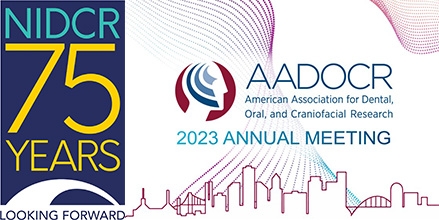
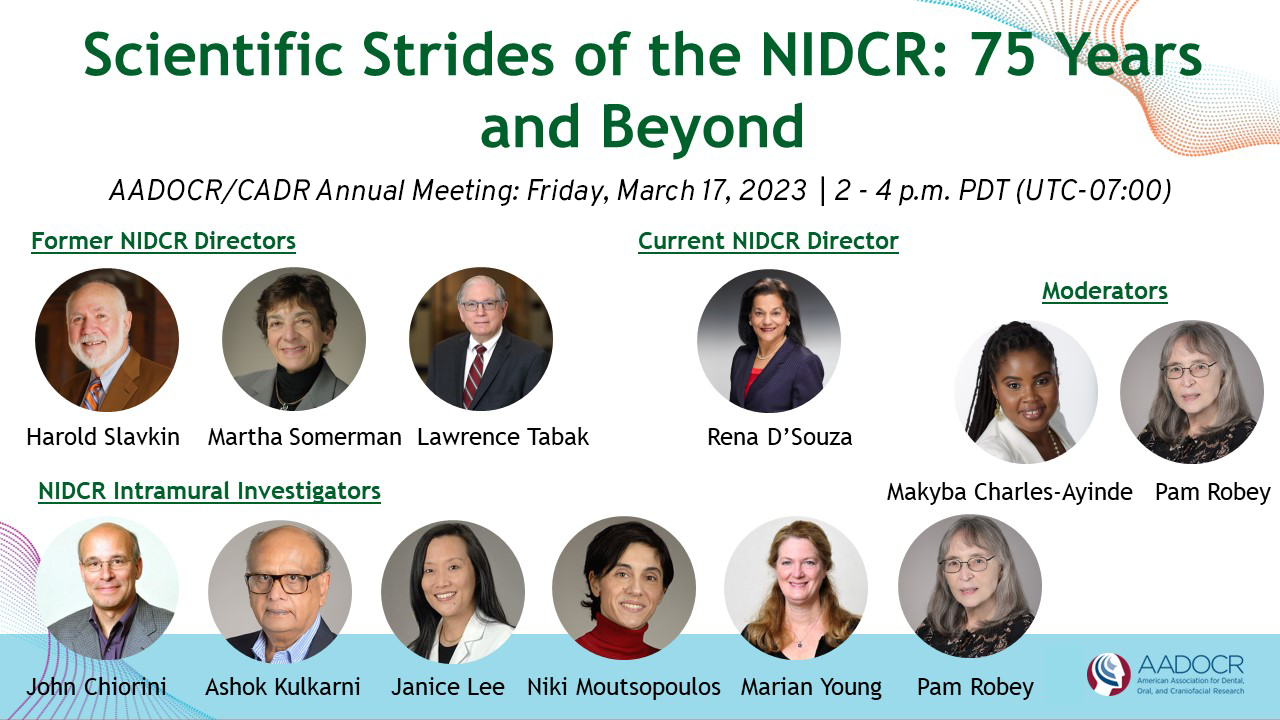
At this year’s annual meeting on March 17th at 2pm PDT, AADOCR will join with NIDCR in a symposium titled “Scientific Strides of the NIDCR: 75 Years and Beyond. This two-part symposium marks the start of NIDCR’s year-long 75th anniversary celebration. In the first part of the symposium, three former NIDCR directors and NIDCR’s current Director, Rena D’Souza, D.D.S., Ph.D., will reflect on their accomplishments, memorable moments, and visions for NIDCR during their directorships. In the second part of the symposium, six intramural investigators will describe the cutting-edge NIDCR research that has shaped dentistry and medicine during their time at the institute. It is a fantastic opportunity to chat directly with instrumental leaders and scientists within the NIDCR enterprise and dive into the vision for the next 75 years. The symposium will also celebrate the NIH/NIDCR 2021 report “Oral Health in America: Advances and Challenges” with an acknowledgment of its 400-plus contributors. Don’t miss it!

The International Association for Dental, Oral, and Craniofacial Research is an ADA CERP Recognized Provider.
ADA CERP is a service of the American Dental Association to assist dental professionals in identifying quality providers of continuing dental education. ADA CERP does not approve or endorse individual courses or instructors, nor does it imply acceptance of credit hours by boards of dentistry.
Concerns or complaints about a CE provider may be directed to the provider or to the Commission for Continuing Education Provider Recognition at CCEPR.ada.org.



